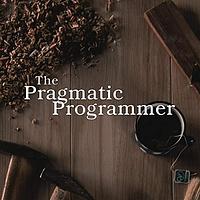Take a photo of a barcode or cover
226 reviews for:
The Pragmatic Programmer: 20th Anniversary Edition, 2nd Edition
David Thomas, Andrew Hunt
226 reviews for:
The Pragmatic Programmer: 20th Anniversary Edition, 2nd Edition
David Thomas, Andrew Hunt
Solid book when you are starting journey of a developer. Great guiding principles but don't be dogmatic about using them. They are useful, but they should not restrict creativity or practicality in problem-solving. The authors, Andrew Hunt and David Thomas, provide invaluable wisdom gleaned from their years of experience in the field. Their insights on "how to think" rather than "what to think" are exceptionally helpful for newcomers.
The book covers a wide range of topics from basic coding practices to effective debugging techniques, and from code optimization to managing your career as a programmer. The engaging writing style, coupled with numerous practical examples, make the book a pleasant read.
One of the key takeaways from the book is that a good programmer is not just about writing code, but about understanding the problem at hand and devising the most efficient solution. This philosophy is repeatedly emphasized throughout the book, highlighting the importance of being a "pragmatic" programmer.
Although the book is targeted primarily at beginners, even seasoned programmers can benefit from the wealth of advice it offers. However, some might argue that the book is somewhat outdated, as it doesn't delve much into recent trends like cloud computing or machine learning. Despite that, I believe the principles the book teaches are timeless and apply to any programming context.
While I recommend this book for its practical wisdom and broad coverage, it's important to remember that it's not a step-by-step coding manual. Instead, it provides a framework to think, behave, and approach problems as a developer.
In summary, The Pragmatic Programmer is a must-read for anyone embarking on a programming career, offering a great foundation on the principles and mindset needed to succeed in this field. \
The book covers a wide range of topics from basic coding practices to effective debugging techniques, and from code optimization to managing your career as a programmer. The engaging writing style, coupled with numerous practical examples, make the book a pleasant read.
One of the key takeaways from the book is that a good programmer is not just about writing code, but about understanding the problem at hand and devising the most efficient solution. This philosophy is repeatedly emphasized throughout the book, highlighting the importance of being a "pragmatic" programmer.
Although the book is targeted primarily at beginners, even seasoned programmers can benefit from the wealth of advice it offers. However, some might argue that the book is somewhat outdated, as it doesn't delve much into recent trends like cloud computing or machine learning. Despite that, I believe the principles the book teaches are timeless and apply to any programming context.
While I recommend this book for its practical wisdom and broad coverage, it's important to remember that it's not a step-by-step coding manual. Instead, it provides a framework to think, behave, and approach problems as a developer.
In summary, The Pragmatic Programmer is a must-read for anyone embarking on a programming career, offering a great foundation on the principles and mindset needed to succeed in this field. \
informative
lighthearted
fast-paced
A great toolbox of knowledge for the modern programmer
informative
inspiring
informative
medium-paced
In my estimation, this book is far more suited for assisting an apprentice to journeyman, rather than journeyman to master. The concepts are relatively basic, even if a good foundation if you've never used them or heard them.
Out of date, although there are a few gems here. Most of this can be gleaned from better books including Clean Code and Head First Design Patterns.
informative
reflective
slow-paced
Ok, I am going to try to save you some time. This book, phew, its good, in fact, it’s very good. But, it’s also massively outdated. Unlike fine wine, this book didn’t age very well.
If you are an experienced (and good) programmer, you are better off reading other books because a lot of industry terms used in this book have disappeared from the contemporary programming lingo.
If you are a novice, dabbling into sea of programming, you should read other modern books because they are going to be more relevant to the modern programming ethos.
So who should read this book?
I know many brilliant programmers that have accumulated awful practices over the years because their bosses weren’t good (pragmatic) programmers. If you are one of those people that carry a lot of poor practice baggage from your previous employments, this book will help you identify your shortcomings and unlearn bad behaviors. Don’t know what could you doing wrong as a programmer? Read this book and you’ll know.
Another group that will benefit from this book are Software Development Managers. This book has some good tips about the software development practices, and how to build a team culture that is more productive, confident, and inclusive. Topics discussed in this book will help you and your team write better and scalable code that is easier to manage and build upon.
If you happen to code a time machine and find yourself in the 90s having lost your programming chops due the said time travel, this book will help you become not only a good programmer, but also a pragmatic, logical, data-driven, curious, and honest person.
If you are an experienced (and good) programmer, you are better off reading other books because a lot of industry terms used in this book have disappeared from the contemporary programming lingo.
If you are a novice, dabbling into sea of programming, you should read other modern books because they are going to be more relevant to the modern programming ethos.
So who should read this book?
I know many brilliant programmers that have accumulated awful practices over the years because their bosses weren’t good (pragmatic) programmers. If you are one of those people that carry a lot of poor practice baggage from your previous employments, this book will help you identify your shortcomings and unlearn bad behaviors. Don’t know what could you doing wrong as a programmer? Read this book and you’ll know.
Another group that will benefit from this book are Software Development Managers. This book has some good tips about the software development practices, and how to build a team culture that is more productive, confident, and inclusive. Topics discussed in this book will help you and your team write better and scalable code that is easier to manage and build upon.
If you happen to code a time machine and find yourself in the 90s having lost your programming chops due the said time travel, this book will help you become not only a good programmer, but also a pragmatic, logical, data-driven, curious, and honest person.
challenging
informative
inspiring
relaxing
medium-paced
informative
medium-paced
The best book for someone working with software
The advice is good, but there is so much good advice that if one were to implement all the good ideas, simple tasks would never get done.



